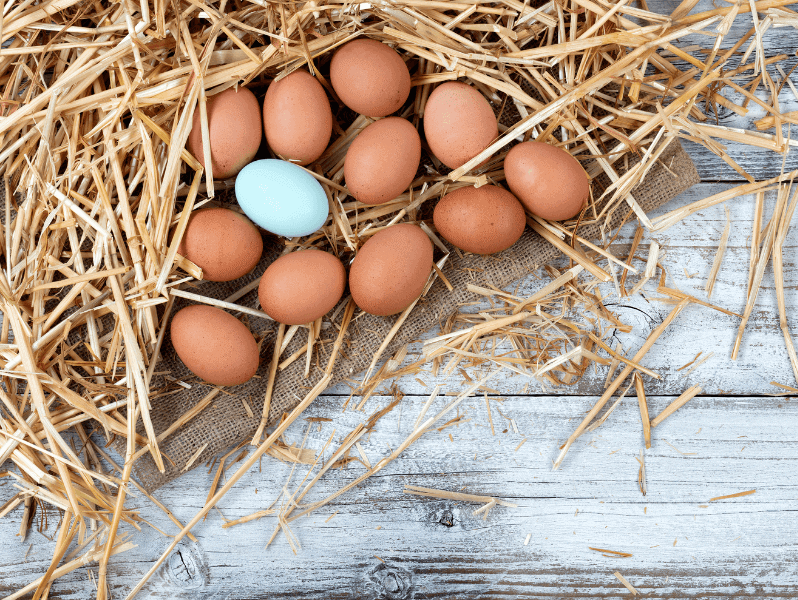Game
Why Has My Chicken Never Laid an Egg?
One fine day, my friend embarked on the task of tidying up her chicken sanctuary. As she emerged from the coop with a tinge of disillusionment, my curiosity compelled me to inquire about the cause. To my query, she expressed her disappointment over a pair of chickens that had never graced her with an egg. When your primary motive for tending to chickens revolves around the desire for farm-fresh eggs, it can indeed be exasperating to ponder upon the enigma of an eggless fowl.
There are multiple factors that can affect a chicken’s egg-laying ability, encompassing the hen’s age, the level of sunlight she receives, the extent of stress she experiences, and even potential illnesses. Additionally, it is intriguing to discover that hens are capable of concealing their eggs, which can come as a surprise.

Please be informed that this article might consist of affiliate links. Should you decide to buy a product using any of our affiliate links, we may receive a modest commission without any additional charges for our esteemed readers.
Age Matters
Similar to creatures of the wild, there comes a juncture in a chicken’s existence when she blossoms into adulthood. For hens, this signifies the commencement of their egg-laying journey.
Don’t hold your breath for any eggs if your hen is still in her early days.
The commencement of egg laying in hens typically occurs at approximately 5 months of age, although the specific timing may differ.
Penelope, a remarkable hen of mine, began her egg-laying journey at a tender age of merely 4 months! However, the majority of my other feathered friends commenced their egg-laying adventures somewhere between the ages of 5 to 7 months.
The same applies to hens that have ceased to lay eggs.
As time passes, hens gradually decrease their weekly egg production, and approximately after a span of 2 years, a noticeable decline in the quantity of eggs obtained becomes apparent.
Regrettably, there are limited options at your disposal to encourage egg-laying from your chickens, provided they haven’t yet attained the age of maturity.
Embrace patience and once they reach the age of laying eggs, introduce these exquisite ceramic eggs into their cozy nesting boxes to provide them with an extra boost – the results are truly astounding!
Explore the myriad possibilities of utilizing your surplus eggs once your hens commence their egg-laying journey!
Do You Have a Rooster?
Should you find yourself in a predicament where your poultry, aged 6-7 months or older, is failing to produce any eggs, take a pause and ponder upon the existence of a potential rooster within your flock.
Seasoned chicken enthusiasts can effortlessly distinguish, yet if you’re a novice in the realm of poultry husbandry, the initial distinction may elude you.
Indications that you possess a rooster are as follows:
Discovering the presence of a rooster in your flock would undoubtedly eliminate any possibility of obtaining eggs. Hence, if your ultimate objective revolves around maintaining a chicken coop for egg production, it is advisable to exclusively acquire female chicks, commonly referred to as pullets.
Sunlight
In order to ensure a steady flow of eggs, your chickens necessitate a minimum of 14-16 hours of daylight daily.
Insufficient exposure to sunlight can greatly diminish egg production, owing to an alteration in their hormonal reactions.
During the winter season, when the days become shorter, daylight hours in the US can dwindle to less than 9 hours. To combat this, it might be a splendid notion to augment the quantity of artificial light. Introduce these remarkable solar chicken coop lights to illuminate and energize your flock, resulting in a boosted egg production!
You have a Broody Hen
The relentless pursuit of perfection in wooing girls may leave you grappling with the temptation to surrender, as every effort you make seems futile.
Despite being well-nourished and receiving adequate light, your efforts to encourage their egg-laying seem futile.
Keep pushing forward, the victory is within reach!
Your lovely ladies may be in full-on motherhood mode.
Regardless of how much sunshine or artificial light you provide, your hen will cease to lay eggs under these circumstances.
No matter what you offer her, she remains resolute in her decisions.
When chickens become broody, their sole desire is to be reunited with their precious baby chicks. They wholeheartedly dedicate themselves to the task of incubating their eggs, refusing to abandon them for a complete span of three weeks until the momentous hatching takes place.
This implies a complete absence of eggs for a period of 21 days, which typically amounts to a range of 15-21 or even more eggs under normal circumstances.
This is utterly unacceptable!
If you suspect that you have a broody hen, keep an eye out for these telltale signs:
Don’t underestimate the possibility of discovering hidden treasures in the form of eggs. Explore not only the nesting box but also the surrounding coop and run, as there might be a secret sanctuary where she has crafted her own nest.
Discovering concealed eggs has been an occurrence that I have encountered multiple times!
Oh, and we had the pleasure of witnessing a broody hen successfully hatching her own adorable chicks! Feel free to indulge in the delightful video right here!
Sickness
Now what?
Your chickens thrive on ample nourishment, basking in abundant sunlight, devoid of any broody hens or concealed eggs within their domain.
Additionally, your flock ranges from 7 months to 2 years in age.
However, for some mysterious reason, you continue to be unsuccessful in obtaining any eggs.
It’s an absolute nightmare, the epitome of frustration!
However, it is plausible that they could be unwell. Chickens afflicted with ailments such as stress, molting, or parasites will probably exhibit a decrease in egg production.
Stress
In the midst of stress, productivity eludes us! Our attention wavers, making it challenging to center ourselves on the present tasks.
Chickens, in terms of similarity, can be quite comparable to one another.
Should your girls find themselves under stress, it is possible that their egg-laying activity may come to a halt.
The weather or fluctuations in temperature, the introduction of new chickens to the flock, overcrowding, dehydration, predation, or the presence of an overly energetic rooster can all contribute to the occurrence of stress.
Should you suspect that your poultry companions are experiencing stress, keep an eye out for these telltale indications:
Your feathered companions may exhibit any of these indications, implying that they are experiencing stress.
Stressed chickens have a knack for refusing to lay any eggs!
It is absolutely crucial to ensure that your coop is impenetrable to predators, provide your flock with ample nourishment and pristine, pure water, maintain a balanced ratio of hens to roosters, and cautiously introduce new chickens to the existing flock.
Molting
As I stepped into the chicken coop, my eyes were drawn to a scattered collection of feathers adorning the floor.
Amidst a momentary rush of anxiety, a swift exploration on Google unveiled the truth – my beloved chickens were merely experiencing their customary yearly feather renewal.
As the autumn months set in, chickens aged one year and above frequently commence shedding their feathers.
The process of shedding feathers or skin is famously referred to as moulting.
The chicken’s appearance often resembles a remarkable plucking session, which can endure for a duration ranging from six to twelve weeks.
Throughout the process of moulting, chickens dedicate their energy towards crafting fresh plumage, resulting in a temporary hiatus from egg-laying activities.
As soon as her vibrant feathers regain their former glory, she will embark on the journey of laying eggs once more, provided that all the ideal conditions for egg production are met.
Cold or Parasites
Should your poultry display glistening nostrils or engage in strolling with its beak agape, it is plausible that it is afflicted with a common cold.
The displayed indicators point towards the chicken’s respiratory distress.
In this scenario, it is advisable to separate the ailing chicken suspected of having a cold, in order to prevent its transmission to the rest of the flock.
A pale comb on a chicken is yet another indication of its illness.
It often indicates that the avian creature is afflicted with worms, mites, or lice, typically.
One cannot help but observe their incessant scratching.
Eliminate this infestation by generously applying a poultry cleanser to both the chicken and their cozy coop.
Enhance the allure of nest spaces and steer clear of cramped surroundings to ensure your hens are motivated to produce nutritious organic eggs. Regularly gather the eggs and consider introducing faux ceramic eggs to the coop to guide them towards the ideal laying spot. Moreover, if you have a specific target of a dozen eggs per week, determine the required number of hens to achieve this goal!
What is the best thing to include in a chicken’s diet so that they lay more eggs?
The diet of your hens plays a significant role in the quality of their eggs. To ensure both a high egg production rate and the overall satisfaction and nourishment of your feathered friends, consider incorporating a variety of nourishing treats. Opt for a reputable brand of pellets specially formulated for egg-laying hens. Additionally, offer them fresh and organic green vegetables from your garden, like pak choi, spinach, kale, millet, or silverbeet. These leafy delights will not only keep your hens happy but also contribute to their egg-laying prowess. Lastly, consider providing them with protein-rich snacks such as pumpkin seeds, oats, and mealworms, as these treats will aid in boosting their egg production.
What breeds do not lay eggs?
Certain chicken breeds exhibit limited egg-laying capabilities throughout the year, which may prompt you to ponder why your feathered friend hasn’t graced you with an egg. If your intention is to venture into the realm of egg production, it’s advisable to steer clear of breeds that have a tendency to lay fewer eggs. Examples of such breeds, known to yield less than 100 eggs annually, include Ameraucana and Silkies. On the other hand, if you seek chickens with impressive egg-laying prowess, look no further than the esteemed Rhode Island Reds and the illustrious Buff Orpingtons.
Ever wondered why my feathered friend hasn’t bestowed upon us a single egg? We’ve thoroughly examined all potential causes behind this curious phenomenon. Perhaps our beloved hens are lacking proper nourishment, deprived of sufficient sunshine, afflicted by ailments, undergoing a molting phase, or simply too young to embark on their egg-laying journey. To spare our poultry from unnecessary stress, let us diligently guard them against predators and unwelcome roosters. Remember, a little patience goes a long way!
Unearth the secrets of your chicken’s egg-laying quandary with this comprehensive guide! Unlock the mysteries behind the question “why is my poultry not laying eggs?” And discover effective solutions to remedy the situation. Soon enough, you’ll be rewarded with a bountiful supply of recently hatched eggs!
